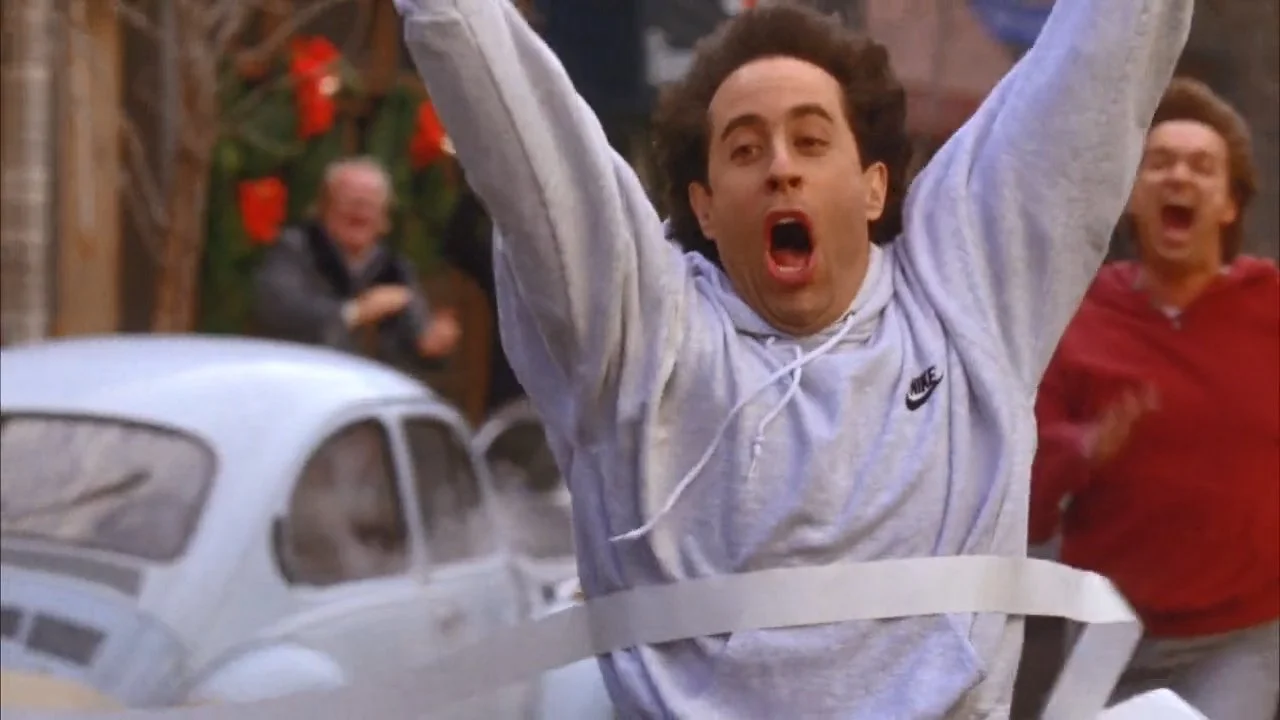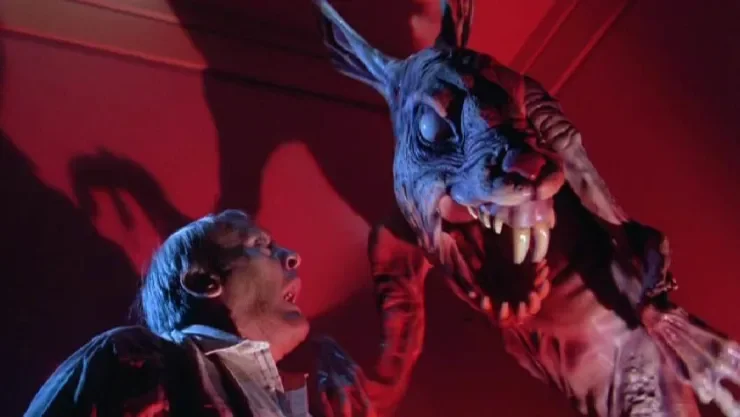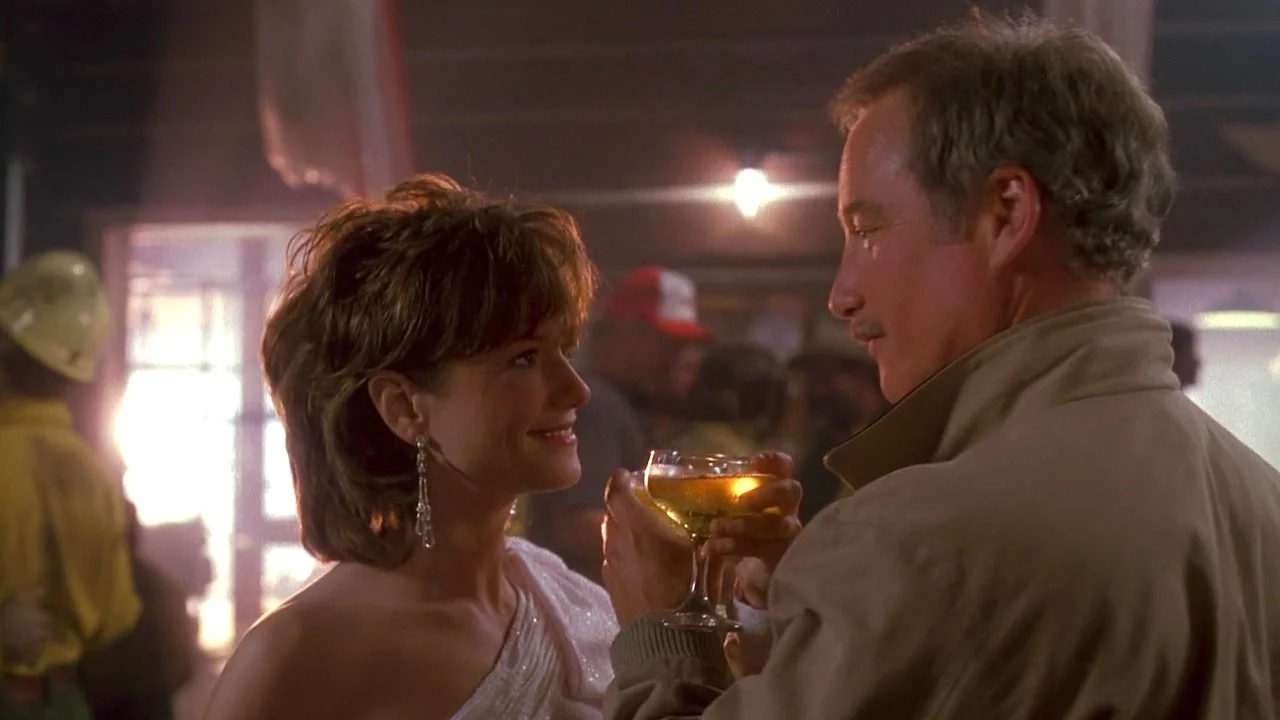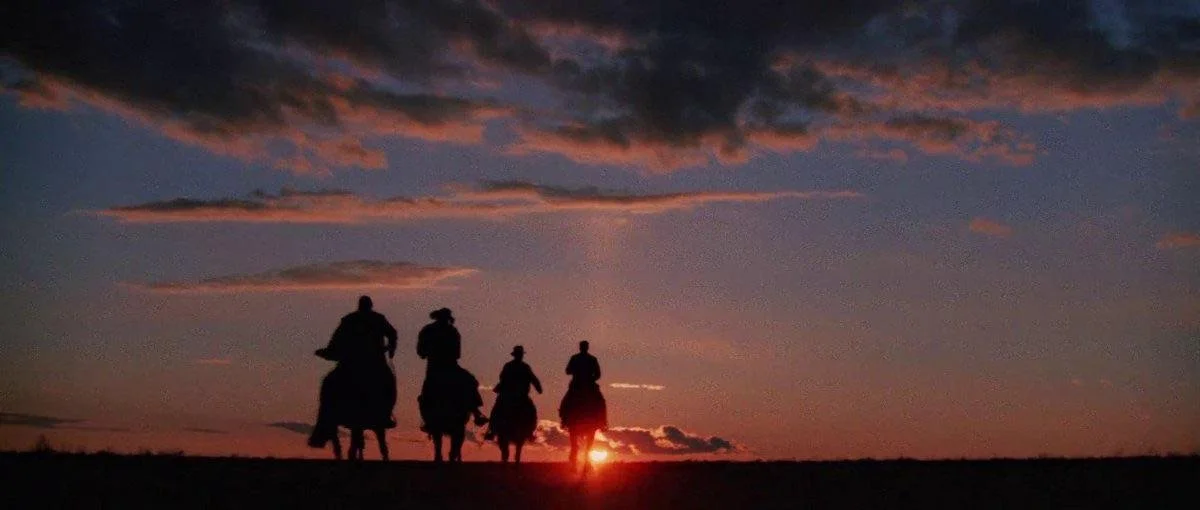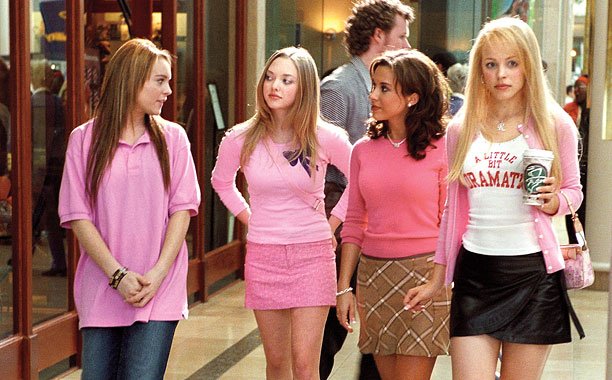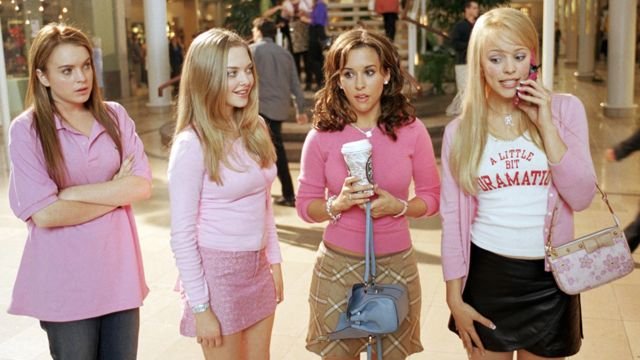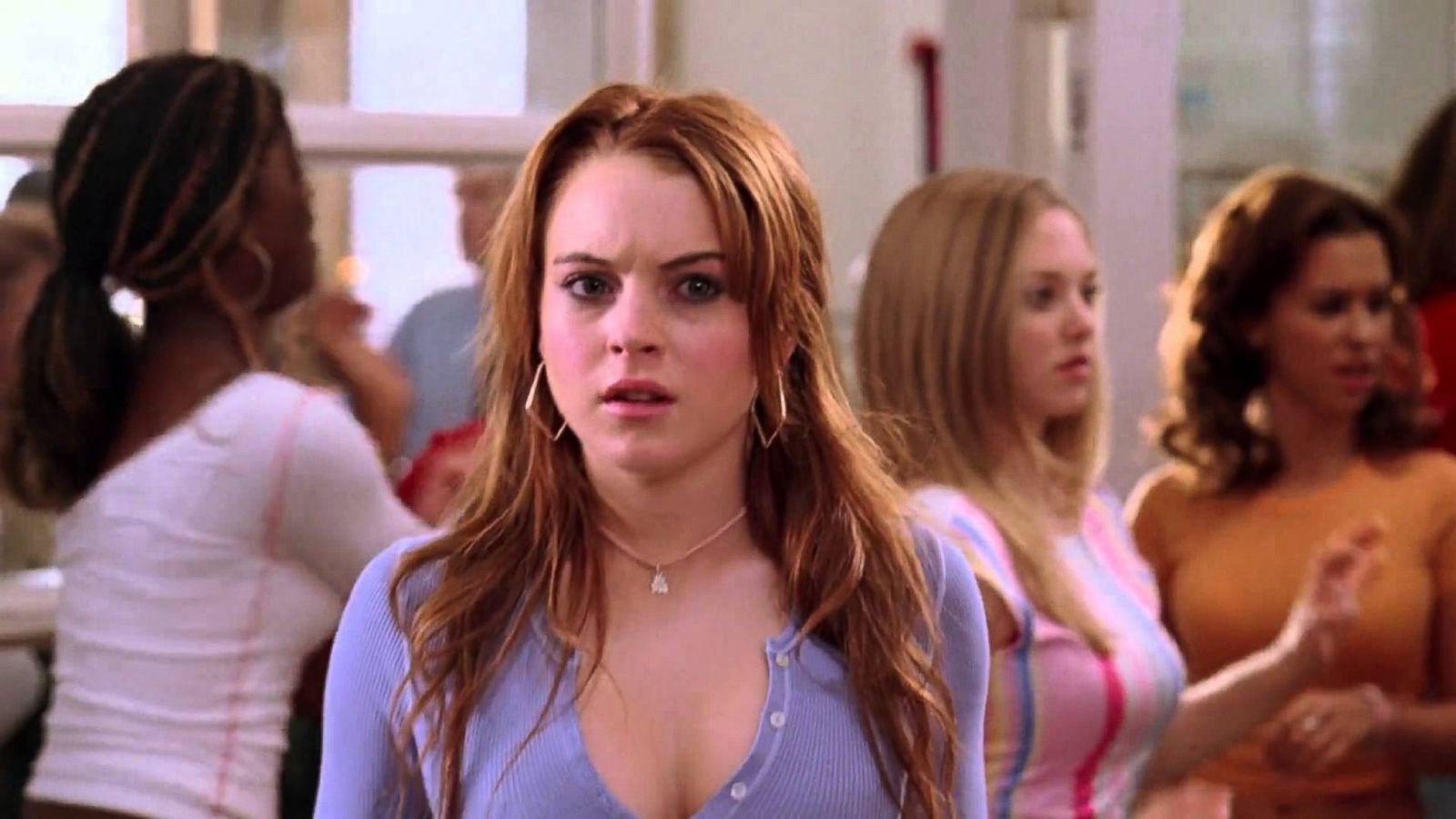Recent Articles
The Surprising Endurance of MEAN GIRLS
This week, I’m relieved to announce that the 2004 comedy MEAN GIRLS remains a classic almost twenty years later, despite a lot of things theoretically working against it. It endures so much, in fact, that I ended up bailing on my initial gimmick for this article. What was it? Read and find out!
1. SO NOT FETCH
Nostalgia is a funny drug.
We humans tend to overrate the past at the expense of the present, and use that feeling to inform the future. “Things were just better twenty or thirty years ago”, we say. “Life was easier”, which it often is at the beginning of our lives, when we have the capacity to ingest and process sugary crap and the ability to live without major responsibilities. It can feel like we spend our entire existence trying to enter our peak, only to get there and immediately yearn to return to when we were first starting the climb. What can I say? We’re hard to please.
The truth is, of course, that most periods of time are roughly equivalent to every other. There are valleys (living during WWII) and peaks (living after WWII*), but for the most part for most people, major social plusses came with many unrelated minuses, pushing life to about even. Kids in the 80’s got to enjoy peak NBC Letterman and the explosion of blockbuster entertainment, but lived with the specter of a Russia-induced nuclear holocaust that could begin at almost any second. Kids these days have access to essentially all of the world’s information and knowledge at any time and any place, yet must live in a world where making public every moment of your life has been practically de riguer since birth. So it goes.
*Assuming you were white. Being male was a good idea, too.
For me, nostalgia is even more of a funny thing. I more or less grew up in the 2000’s, a decade I now spend way too much time thinking about in the 2020’s. It’s a set of years I often look back on with fondness, even though I really have no reason to. I began the decade smack dab in the middle of sixth grade and ended it with just a few more months of college left to go, a time period anthroplogists refer to as The Most Embarrassing Ten Years of My Entire Fucking Life. It was an excruciating time mostly marked by having to figure out how to regulate emotions for the first time, greatly exacerbated by the advent of LiveJournal and the beginnings of sharing every dumb thought in your head to countless strangers on the internet.
It didn’t help that, purely in terms of popular culture, the 2000’s were largely a wasteland. Some grand things were on the horizon in terms of television (LOST, Mad Men, Breaking Bad and Friday Night Lights all premiered in this decade, all within three years of each other), and I think actually there were some things to like and admire in popular music, although you had to know where to look (alternative college stations were a good place to start). Even with those silver linings, though, you had to filter through the glut of depressing reality shows (for those who think it gets no worse than Keeping Up With the Kardashians….my brother, you have no idea how much trashier it can get; Calabasas’ favorite family comes off as downright classy compared to something like Are You Hot?) and the continued poisoning of political discourse (his image has been severely rehabbed over the years, but getting the net average Republican and Democrat together in mid 2004 and asking them what they thought about George W. Bush was asking for someone to get killed, possibly yourself).
The worst was the movies*. The current “IP and Superhero” era we appear to maybe be entering the end of is often cited as the worst one in Hollywood history, which may or may not be true. However, we often overlook just how…ugly….and goopy…and orange everything seemed to look like in a post-9/11 world. To get an idea of what every blockbuster looked like in high school, one can look no further than the poster for 2002’s THE SCORPION KING. It really has it all: a bunch of muscle-bound actors making faces into the camera against uncomfortable fire colors, all with a vague “extreme” aesthetic. Bleak times.
*Okay, I suppose the worst was the terrorist attack and financial crisis that respectively bookended the decade. But then again, have you watched BATTLEFIELD EARTH lately?
Crucially, there also weren’t a lot of movies with anything resembling wit. Just as an example, Will Ferrell was leaving SNL and cranking out the hits (OLD SCHOOL, ELF, STEP BROTHERS, TALLADEGA NIGHTS, to name just a few), and they absolutely have their fans, but they (along with seemingly every other comedy at the time), seemed to dabble exclusively in either manic, obnoxious, frat, or manically obnoxious frat humor*. Fun times could be had at the mall cineplex or on a date or something, but there seemed to be a lot of empty calories going around comedically.
*Don’t get me wrong, I quite like Will Ferrell as a comedian. His countless appearances on late night shows are legendary, and he’s a top-five SNL cast member ever. His movies just don’t do anything for me, is all.
During my time in high school (2002-2006), there were really only three movies that people seemed to quote with any regularity: ANCHORMAN: THE LEGEND OF RON BURGUNDY, NAPOLEON DYNAMITE and MEAN GIRLS. I don’t really like two of those movies. I have always been really fond of the third.
So this is the MEAN GIRLS article.
II. ON WEDNESDAYS WE WEAR PINK
MEAN GIRLS is kind of a miracle.
For so many reasons, it feels like it should be one of those things, an artifact of a specific time. For starters, it stars Lindsay Lohan, maybe the poster child of the decade, the physical manifestation of what the 2000’s felt like. The precocious child star turned prime tabloid fodder, the performer who burned out so hard on various addictions so publicly, Lohan eventually became such an obvious punchline for a million unfunny talking heads and comedians that you just wanted somebody to air lift her out of Hollywood in order to drop her off at an abandoned silo somewhere for her own good. There were seemingly hundreds of celebrities that fit this bill that decade (almost always young women), but Lohan always seemed the most tragic.
For second, MEAN GIRLS was created and penned by Tina Fey, as big a guiding directional force for 2000’s comedy as anybody else. Whether she was a force for good or not, however, largely depends not only on who you ask, but when. Her oeuvre is one that feels under constant audit; a quick Google search of “tina fey racist” ought to give you an idea of how it frequently goes for her. Now, in isolation, you can probably successfully defend her on every point of contention. However, when taking it all in totality, you can sort of see how she epitomized a certain comfort comedy had in the beginning of the 21st century in regard to engaging in racial stereotypes under the guise of “I’m not actually racist so”. I think intent is way more crucial in unpacking comedic racial commentary than we make it sound sometimes, but it still gives one much to think about in terms of where elegance comes into play.
On that note, for…thirds? I think? When watching MEAN GIRLS in 2024, you definitely feel its mid-00’s energy begin to show. Teenage girls at a mall? The use of landlines (hands-free though they may be)? Vicious gossip being spread around school via paper? Technology tends to creep up on us, but it’s downright bizarre how different the human high school experience has become a mere two decades later. None of this is to mention how, yes, it also engages in arguable racial cheap shots (its Asian representation remains a point of contention both then and now) and words that would absolutely not be used now, Regina George’s liberal use of…uh, the r-word being the most obvious candidate. Obviously, it’s not used in order for anyone behind the movie to actually put down the disabled (it’s actually one of the most clarifying things about Regina’s true character), and it doesn’t personally offend me. Yet, one imagines this would be an easy rewrite in the here and now; I highly suspect the 2024 remake has worked around this.
And yet, for all of this, MEAN GIRLS remains one of the relatively few stone-cold classics that the 2000’s ended up producing. To watch it now is to marvel at how much of it still works. The casting is essentially perfect all the way up and down the call sheet. Every line is seemingly a perfectly quotable nugget. And its story of a formerly home-schooled girl infiltrating the Plastics, the nastiest most insular clique in school before losing herself in the facade and becoming a Plastic through and through herself is a surprisingly astute one all these years later. No, the movie never gets quite as dark as it clearly wants to be; one of its biggest shock-laughs (Regina getting suddenly hit by a school bus) gets immediately softened, and it generally has to abide by its PG-13 rating. On the other hand, it’s played for laughs that the sex-ed coach gets busted for sleeping with several students, so I’d argue it finds its darkness all the same.
Even the elements I worried would age the film turned out to be some of its strongest. I mentioned above how the fall of Lindsay Lohan felt tragic in a way that other public celebrity meltdowns in the 2000’s didn’t, and that’s because it represented a very real loss of talent. It’s very, very easy to forget how good she used to be; in fact, MEAN GIRLS might represent the last high-quality project she was (or may ever be) a part of. To play the role of Cady Heron requires two things: the ability to play wide-eyed sheltered, almost child-like, wonder and insecurity towards almost everything around you, as well as the capacity for embodying full unbridled bitchiness. Lohan does both with seemingly no effort at all. There are showier performances surrounding her in pretty much every scene, yet MEAN GIRLS likely wouldn’t work at all without her.
And man, are there some showy performances going on here. Just as an example, our three central Plastics are also all wonderful in their own ways, and I’ve always admired how precisely drawn their personalities are, as well as how they work in relation to each other. Karen Smith (Amanda Seyfried) and Gretchen Wieners (Lacey Chabert) are both vapid suck-ups in their own ways to Regina, but there’s also crucial differences in how they go about it. Karen is famously rock-stupid, but also possibly the only truly kind person in the group? Gretchen, on the other hand, sometimes seems actually wounded when she gets her hands metaphorically slapped. There’s a genuine insecurity when, say, she gets told her try-hand slang invention “fetch” is “never going to happen”. As for Regina, she was a star-making role for Rachel McAdams* and I’m not kidding when I say you could feel it in the theater as you were watching it.
*Although I suppose THE NOTEBOOK coming out the same year didn’t hurt.
Then, of course, are the SNL, TV vets and future stars that litter the supporting cast. Amy Poehler (whose “cool mom” of Regina might be my favorite side character of them all). Ana Gasteyer. Neil Flynn. Diego Klattenhoff. Rajiv Surendra. Dwayne Hill. Tina Fey herself. Special shoutout to Lizzy Caplan and Daniel Franzese for taking two roles that could have been stuck in expository dialogue hell and imbuing them with personality.
But then again, even if nobody else in the supporting cast shone, as long as Tim Meadows was there, MEAN GIRLS would likely retain its legendary status. His Principal Ron obviously gets the number one best line of the entire movie (“I will keep you here until four”), but Meadows manages to lift every other one of his lines with this active blank face that makes everything 15% funnier. I don’t mean to be the guy who says a man in a movie with GIRLS in the title is the MVP and, frankly, he’s not. But he’s absolutely the sixth man of MEAN GIRLS.
Of course, it’s kind of difficult to pick the true number one best line. There are the obvious zeitgeisty ones: “I have ESPN”. “Stop trying to make ‘fetch’ happen”. “She doesn’t even go here!” “You go, Glen Coco!” However, I might pitch the dark horse “what are marijuana pills?”. But picking the true number one is difficult because, well, there are a lot of goddamn great lines in MEAN GIRLS. And this leads me to ending this section by defending Tina Fey’s comedic sensibility after acknowledging why maybe not everything about it has aged all that well. Yeah, not everything about her sensibility is great; looking back, she was probably too obsessed with the Hilton sisters in her time as Weekend Update anchor. The content of her humor may not have survived, but the loopy cadence and witty spirit of it lives on, if the lasting endurance of this and 30 Rock is any indication. She was a major reason I fell in love with comedy in the first place, so I’ll never fully write her off.
Nostalgia is a funny drug.
III. THE LIMIT EXISTS
So, I have something to confess.
Full disclosure time: the plan for this month’s article was to not just wax on about the original MEAN GIRLS, but to also compare it to the remake/musical adaptation that came out this month. If nothing else, I find the very concept of the new movie fascinating: it’s a movie adaptation of a Broadway musical adaptation (also penned by Fey!) of a twenty-year old original that also appears to double as kind of a straight-up remake. What is one to think when many of the joke structures of the original seem preserved, and a pair of original cast members return in their old roles? MEAN GIRLS 2024 seems like an attempt to bridge two generations in one two-hour musical.
My vision for this month’s article was to enter into the 2024 MEAN GIRLS remake with full eyes and a clear heart, and assess what the Gen Z version of a millennial favorite might look like. Hell, it might have even allowed me to go on a good old-fashioned screed about the relative creative bankruptcy of the current Broadway practice of taking well-known intellectual properties, adding fifteen bullshit songs and an additional forty minutes, then waiting for the cash to roll in. It probably would have been a really interesting article.
The thing is…I couldn’t do it. I couldn’t bring myself to see the new MEAN GIRLS.
It’s not out of some sort of confusion as to its general existence. The musical is popular! The movie stars well-known people! It’s fucking January, a month that could use a little sugary pop at the box office! And I am a recent convert to the Church of Renee Rapp, just like everybody else who have found her scorched-earth style of handling press junkets to be delightful. This is not me making a big show of Refusing to See Something. It’s not even out of a pearl-clutching “how dare they” moral outrage as to how they could possibly touch a nostalgic classic. Again, the 2000’s fucking sucked. Touch away, you monsters.
But I just couldn’t get myself to hop in the car, take out my wallet and cough up twelve bucks on a weekend day to see a copy of a movie that means more to me than I guess I thought. And I will remind you I blew a free afternoon to watch THE EXORCIST: BELIEVER. So, instead, the remainder of this article is going to be about breaking down exactly why I decided to abandon its actual crux.
To be clear, there are a couple of things about MEAN GIRLS 2024 I find concerning. As I had never heard it before, I did work my way through the original cast recording of the Broadway score and was dismayed to find that none of the songs were particularly catchy in melody or memorable in lyric, a red flag in an adaptation of one of the most quotable movies of its generation. Although I disliked very little of what I heard, it also provided little of the loopy joy practically every other line of the original movie did. I took a break from the soundtrack and ultimately never came back to it.
More disheartening are the clips I’ve seen where it looks like the screenplay for the 2024 version is mostly going for doing the same jokes from 2004, only a little worse? It’s one thing to recast most of the adults, one of those things that just has to happen if you’re remaking a twenty-year old movie (although my brain is also refusing to adjust to Busy Phillips replacing Amy Poehler as Regina’s mother). But then Tina Fey and Tim Meadows are returning as the same characters, presumably as some sort of nod to continuity? I’m not sure why that would matter, but I suppose it’s possible. I imagine it might also be that they were the two cast members that didn’t necessarily age out of their characters, or maybe it’s just Tina putting her thumb on the scale a bit, bringing her friend along with her. Whatever the reason, there they are, confusing the intent of the entire endeavor just a bit.
The point is, it appears MEAN GIRLS 2024 is largely just doing the original again, only with alternate takes. Coach Carr, now played by Jon Hamm, is misspelling the word “hormones” on the whiteboard this time, a major step down from the misspelling of “chlamydia” the first time around. Meadows’ “I did not leave the south side for this!” has been downgraded to “I did not go to graduate school for this!” I dunno, I’m already not a fan of movie remakes/reboots trying to court fans of the original by pointing at something and going “remember this?”. However, it turns out what I hate even more is someone waving something in my face and asking “remember this?” and the thing in their hand is only vaguely recognizable.
I would imagine the best path forward for a project like MEAN GIRLS 2024 is just to rebuild it from the ground up. An updated MEAN GIRLS is not the worst idea in the world; technology changes, but kids remain the same throughout generations. I don’t begrudge the idea of replacing three-way phone calls for FaceTiming and TikToks. Sunrise, sunset and all that. But that means you have to let the old jokes go, too. And replacing them with new ones. New ones without any of the old cadences and setups. And that’s difficult when the whole point of the endeavor is to present yourself in the shadow of an original.
I should make it clear: this is not me declaring MEAN GIRLS 2024 as bad! How could I? I didn’t see it, and I’m not in the habit of making a definitive evaluation of something I haven’t seen or read or listened to. But I highly suspect it would be a waste of my time, speaking as someone who is both a humongous fan of the original and as someone outside the very targeted demographic the new one is seeking. Maybe there’s value in realizing these things at a certain point and just letting it go.
As it stands, I couldn’t put the key into the ignition to hear music I didn’t really like paired with old lines I’ve come to love, but rewritten to be just a little worse. Not when I have the original easily accessible at essentially any time. So I didn’t. I’m happy to just kind of live in a world where the original MEAN GIRLS is a singular entity. I’m happy to pretend Tim Meadows didn’t come back to the role, either in the 2024 musical or in the 2011 TV sequel. I guess I just didn’t want the spell broken.
Nostalgia is a funny drug.
THE BLING RING Goes In Circles
This week, we dive deep into THE BLING RING, Sofia Coppola’s first real misfire. It’s a movie that neither serves as effective parody or sincere deep dive into the 2000’s, one of the bleaker cultural American decades. So, what went wrong?
The 2000’s were a terrible time.
I’m allowed to say that. I was there.
Demographically (and calendar…ically) speaking, my adolescent years ran from 1998 to about 2009 or so. With a birth year of 1988, I didn’t experience the 1980’s in any meaningful way, and most of the 1990’s are actually kind of a blur; I don’t think I really processed things in front of me as “oh, a new TV show/cartoon/movie/song” until 1997, 98 or so. Thus, the 2000’s were the first decade I got to consciously experience from beginning to end.
It was a bad time.
To be clear, I didn’t necessarily have a bad time; my adolescent and teenage years had the ups and downs you might expect, but the average day was probably no worse or better than yours. I went through the same peaks (realizing there are a few things I’m actually really good at! Developing a close-knit friend group!) and valleys (realizing there are many more things I’m not good at! The realization that there was more darkness in my family than anyone let on!) that most kids go through.
It was just….all the stuff around us. It’s hard to pinpoint exactly what was so awful about the detritus that was the Aughts. The things that come to mind aren’t exactly unique to that time; parasitic celebrity gossip wasn’t new in 2000, loud and obnoxious blockbusters meant to be consumed and forgotten were in their third decade at that point, an weird shifts in popular music taste** just kind of comes with being alive.
* That was part of it too, we never landed on a satisfying, rhythmic name for the decade.
** Although, man, if you weren’t there for that moment when boy bands were out and nu-metal was in, seemingly overnight, you missed out. It was hilarious, like someone hit a switch or something.
However, it did kind of all feel vaguely like maybe we were in the beginning of the end. Cheap reality television exploded, first off the backs of solid network hits like SURVIVOR and THE AMAZING RACE, then accelerated by cheapie celebrity fodder like THE OSBOURNES and THE SIMPLE LIFE, before practically mandated after a late-decade writers’ strike that ground the only decent programming out there to a halt. Media outlets like TMZ added a really sadistic and snarky streak to the gossip rags, encouraging us to giggle and roll our eyes at the deteriorating health of public figures like Britney Spears, Lindsay Lohan, and Amy Winehouse (semi-related note: most stand-up comedy in the 00’s was godawful, too). And, although I personally believe them to be pretty great in their own ways, the 2008 summer releases of IRON MAN and THE DARK KNIGHT are more or less responsible for the current collapse of the superhero movie genre, and maybe all of Hollywood.
Oh yeah, and 9/11. That sucked, too.
So, when I learned that a filmmaker that I really liked, and one that always managed to have something to say about her favorite subjects (the ennui and isolation of upscale life being a big one), made a film based off one of the last “celebrity culture” news events of the decade, I got excited. Sofia Coppola making a movie about the Bling Ring felt like a match made in heaven.
So, of course it sucked. Why wouldn’t it? Everything else about the 2000’s did.
THE BLING RING (2013)
Starring: Emma Watson, Israel Broussard, Katie Chang, Taissa Farmiga, Leslie Mann
Directed by: Sofia Coppola
Written by: Sofia Coppola
Released: June 14, 2013
Length: 90 minutes
“THE BLING RING? More like Bore Ring!” - my wife
Yeah, look, I’m just going to get straight to the point. I didn’t like THE BLING RING much, if at all. It was a shocking crash following the high of Sofia Coppola’s previous film, SOMEWHERE, a movie I just about loved due to her instincts as a director guided her to an unbroken series of good decisions. Here, the complete opposite occurred, and I’m left to try to figure out what happened.
For those not in the know, THE BLING RING is a movie based off a real event (specifically, it’s based off a 2010 Vanity Fair article), where a group of seven Calabasas teens who started just kinda walking into the mansions of nearby celebrities when they weren’t home and taking off with some of their outfits (one of the teens referred to it as “going shopping”). They were all mostly fashion, reality television and social media obsessed. In fact, one of them, Alexis Neiers, was in the middle of shooting a reality show pilot for E! when the arrests were made (that show, Pretty Wild, ended up airing in 2010 and lasted nine episodes).
In the actual movie, the names have been changed, presumably to make it more of a fictionalized account. Nick Prugo becomes Marc Hall (Broussard), the repressed outsider and de-facto audience surrogate (and perhaps the only character in the entire movie Coppola actually empathizes with, more on that in a bit). Rachel Lee becomes Rebecca Ahn (Chang), the ringleader. Neiers becomes Nicki Moore (Watson), perhaps the most ready for fame of them all. Tess Taylor and Courtney Ames become Sam Moore (Farmiga) and Chloe Tainer (Julien), who…well, I don’t really know. The movie is largely uninterested. Together, they decide to start breaking into the mansions of the biggest celebrities the 2000’s could allow. Audrina Patridge. Megan Fox. Orlando Bloom. And, of course, Paris Hilton.
It’s not the worst source for a movie premise ever (especially since I’m writing this in a week where a trailer just dropped for a movie based off a fucking Twitter thread from a Buzzfeed employee), and it presents several opportunities. For one, it sets the stage for a unique take on a standard crime/heist film. For another, the idea of glitz and glamour glossing over a sadder reality is right up Coppola’s alley. Heck, it even provides avenues to explore a lot of sneakily-fascinating themes, the most prominent being the fact that, for as racialized and class-based the depiction of crime has traditionally been in media, it was ultimately fellow rich kids that brazenly robbed the affluent this time around.
It doesn’t even really matter that the ending is a forgone conclusion; the mere fact that we even know about this story at all implies they get caught. That’s okay! Not every story needs to be full of twists and turns. Heck, many crime films deal with this. As long as the characters are somewhat compelling (even if (especially if!) we don’t like them), watching the noose tighten around the necks of amateur criminals can be thrilling!
Funnily enough, the moment I accepted that THE BLING RING probably wasn’t going to suddenly make a comeback was when we inevitably reached the scene where the members of the ring are systematically arrested. Theoretically, in a crime story such as this, when you reach the moment justice catches up to our criminal protagonists, you want to feel one of two emotions:
Catharsis - these unlikable burglars are finally getting what’s coming to them and you can’t wait to see them squirm under the pressure;
Sympathy - you somehow feel for these admittedly shallow, privileged teens who were too bored and stupid to realize they were about to ruin their lives
What you don’t want to feel is what I felt, which is nothing. I felt roughly equivalent to the way I would had I merely skimmed to the Arrest and Aftermath section of the Bling Ring’s Wikipedia entry. And I realized the whole movie up to that point had felt like that, like I might have been better off just reading the Vanity Fair article and calling it a day.
This was…really shocking to me. And disappointing in a way I wasn’t prepared for. Because Sofia Coppola has spent seemingly her entire career dodging accusations of making boring movies with nothing to say about the lives of the rich people she depicts. I’ve always found this to be a really reactionary and frankly surface-level take, one borne of a willful refusal to sit down and engage with her material. Even her worst movie up to this point in her career (MARIE ANTOINETTE) absolutely has something to say about its titular subject. Whether or not you agree with her take on the famous French queen, she found an angle that she was intrigued about, and executed on it. It’s not my favorite, but it isn’t boring, and it isn’t about nothing.
So it went previously with LOST IN TRANSLATION and afterwards with SOMEWHERE, two movies about actors implied to be of means that aren’t all that likable on the page, but manage to break your hearts by the end. Hell, even THE VIRGIN SUICIDES found a way to depict frightened religious parents with a large degree of empathy and understanding, where a lesser movie would have made them the clear and obvious villains. Making the inherently vacuous kind of compelling (Midwestern suburbs, rich performers, the French aristocracy) has long been Coppola’s superpower. Tackling mid-00’s little Hollywood Hills shits should not have been that big of an issue.
But with THE BLING RING? What else can I say? She finally made the kind of Sofia Coppola movie everyone thought she had been making all along.
———
THE BLING RING has good moments and items of merits here and there. I really liked Leslie Mann as Nicki’s “The Secret” spouting stage mom, who’s written with just the right amount of blank-faced vacuousness to set the stage for a larger theme to the film (did these kids ever really have a chance?) that never comes. Emma Watson is an obvious highlight in the cast, although I was expecting something more transcendent from the way everyone was carrying on about her (I can only surmise that in 2013, people still associated her with Hermione Granger, and were amazed that she could play a completely different type of role, i.e. what an actor does).
The closest the movie gets to evoking an emotion is a scene where Sam finds a gun in Megan Fox’s house and starts waving it around wantonly in Marc’s face. Despite his protestations, she never seems to practice any common sense with the stolen weapon, and a weird tension emerges. There’s no music playing underneath any of this, and given what we know about this found friend group, it sure doesn’t seem like Sam’s coming to her senses anytime soon. Although nothing ultimately ends up happening, I genuinely feared for him here.
Finally, there’s a grim theme that the movie is practically begging for its creator to explore, that of the toxic parasocial relationship people have with fame. The central conceit of rich suburbia feeling entitled to just walk into a celebrity’s mansion and start taking off with stuff is so palpable and so relatable (this entitlement, more than COVID-19, is what derailed the possibility of any future secret album sessions for Taylor Swift fans, I reckon), you kind of can’t believe it doesn’t get addressed much here. It almost feels like a point the movie makes accidentally.
That’s….kind of it as far as positives go! It’s not offensively bad or anything, and I’ve definitely seen much worse. But there’s no insight, not even any active parody. Coppola acknowledges the artificial celebrity trappings that surrounded us in the late-00’s; there are frequent cuts to red carpet photos of Lindsay Lohan and Lauren Conrad and the like. But….so what? Yes, it existed. Now what? So it goes with the final reveal that Nicki is attempting to trade in her notoriety for clout, plugging her website in a tell-all interview. But this is hardly an original thought or insight; much better movies have been riffing on that them for decades. For the most part, THE BLING RING just sits there, content to be a flat and superficial film.
And I can already hear it now: “might this be the point? To reflect the flat and superficial nature of these teens?” And…possibly! This might have absolutely have been exactly the texture Coppola was after. But if that’s the case….well, the movie doesn’t really commit to this, either. Because satirical superficiality can still sing and pop off the screen; Amy Heckerling did it masterfully almost thirty years ago. But here….our core group of teenagers definitely don’t have a lot going on between their ears (outside of maybe Marc), but that’s as far as the satire goes, at least as far as I can tell.
If Coppola’s plan was to make a movie with nothing behind it, as a method of establishing character, it was a bad plan.
———
It dawned on me what the core difference was about THE BLING RING compared to the Sofia Coppola movies that came before. Whether she’s aware of it or not, I don’t get the sense she likes any of her central characters (again, outside of Marc). Yes, you can make the argument that they’re not meant to be likable, and that’s fair. Some of the greatest motion art features unlikable people at their core (hell, AMC gained a second life off the backs of two of them, Walter White and Don Draper). But in both of those cases, Vince Gilligan and Matthew Weiner found their creations fascinating, even when they were being awful. They, and their crack team of writers, liked exploring these guys.
The problem here is that I don’t get the sense that Coppola really cracked what could have been interesting about The Bling Ring themselves. I genuinely think she thought she could, or she certainly wouldn’t have spent two years of her life making it. But at the end of it all, it wasn’t there.
Ultimately, it turned out Coppola just kinda had nothing to say in regards to late 2000’s pop culture, which is a shame, because it was actually a pretty dark time. And maybe diving into the production of a movie set at that time in 2011 was too soon. But you figure if anyone was custom built to come up with something insightful about a very strange era in American culture, you’d figure Sofia Coppola would be the one.
And yet, she found nothing. It provided nothing for her, and she reflected it back in kind. And in a way, doesn’t that make it the ultimate 2000’s movie?
